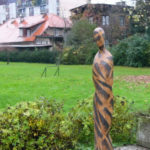By Arsham Parsi
Executive Director
Iranian Railroad for Queer Refugees (IRQR)
www.irq.net
Iranian queers have well-founded fears of persecution based on their sexual orientation or gender identity. The Penal Code of the Islamic Republic of Iran, permits the punishment of queer people by lashing, hanging, stoning, cutting in half by a sword, or dropping from a tall building or cliff.
My own and IRQR’s experiences in researching human rights violations in Iran suggests that in “morals” cases, substantial evidence is likely to be flouted by the judiciary in the name of protecting cultural and religious standards. In Iran, four male witnesses who attest that a defendant is homosexual, even on the basis of rumor or slander, will have their testimony accepted instead of being more rigorously cross-examined.
Iranian legal and judicial procedures ensure that a judge’s prejudice against a defendant, even based solely on a defendant’s appearance or demeanor, is allowed near-limitless scope to determine a verdict based purely on subjective opinion. It is worth noting that even under the reform government of Mohammed Khatami, the Islamic judiciary remained one of the bulwarks of religious conservatism in Iran. This has now strengthened even more under the hardline rule of Mahmoud Ahmadinejad.
The death penalty for homosexuality does not merely exist on paper. It is practiced and enforced widely in the Islamic Republic. According to Amnesty International, at least 734 people have been executed in Iran in since 2008. It is certain Iranian queers were among them. Trials on moral charges in Iran are held on camera, but international outrage over the frequency of executions has led the government to exercise tighter control over press reports of executions. For these reasons, confirming the frequency of executions for homosexuality is effectively impossible. Yet those repressive measures have not been able to hide the ugly truth from the eyes of the world. I will report the following case for legal and historical records.
On May 27, 2010, Iranian security forces raided Reza and Alireza’s apartment and arrested both men, along with some guests who were visiting. Their computer and personal belongings were confiscated as evidence. Reza, 23, and Alireza, 28, are partners and live together in a small rented apartment in Sari. Alireza works at his father’s real estate office. Reza stays at home, as his more outwardly ‘feminine’ behavior attracts homophobic comments from neighbors. Neither of the men’s families accepts their sexuality or their decision to live together as a loving couple.
The guests were released by the security forces a few days later, after being forced to testify that Reza and Alireza lived together as lovers. They say that during their arrest they heard that the police were responding to a complaint by the two men’s families about their sons. Reza and Alireza were sent to the Revolutionary Court of Sari. We do not know what sentence they have received, but there are rumors that it is the death penalty.
As a result of all the pressure and well-founded fear of persecution, many Iranian queers have had to leave Iran and seek asylum. A refugee myself, I went through lots of difficulties and now because of my work with the IRQR I am in contact with hundreds of queer Iranian asylum seekers. Being in limbo is not only unjust and difficult, but also intolerable and frightening.
There is international support for Iranian queers today and I thank all elected officials, organizations and individuals who are working with us in order to help more Iranian queers. But we need more support since the number of refugees is increasing due to Iranian government’s daily pressures.
Some governments sign conventions or issue statements that Iran must stop the violation of human rights of its citizens. But when it comes to refugee issues, they reject asylum seekers and advise them to go back to Iran, hiding their sexual orientation to stay safe. This paradox is very significant.
It seems that in the last few years, most organizations like the United Nations and international governments see Iran’s nuclear program as the only issue of concern. As you know, the United Nation Security Council has passed another sanction on Iran for nuclear enrichment. So why didn’t the first, second or third sanctions work, and what is the point of a forth and further possible sanctions?
In the meantime, queers, women, religious minorities, ethnic minorities, students and just about every single Iranian has no basic human rights or freedom – how long will we continue to talk about nuclear bombs? Why is human rights violation not the first priority of international organizations and governments? Is writing a few official letters and statement on Iran’s human rights situation enough?
Especially regarding the Iranian queer community, we have the responsibility of documenting their unjust situation. Our most difficult issue is not dealing with the Iranian government, but lobbying the European governments to acknowledge the very real fear of persecution Iranian queers have, and their need for international protection. If they have concerns about refugee numbers, then it would be great if they could focus more on human rights issue in Iran and try to find a diplomatic resolution.
Finally, I would like to say that the Iranian Railroad for Queer Refugees is ready to work with all local and international organizations, officials elected, and individuals in order to improve the global queer community.
Let’s dream of a day where no one will be discriminated against for their sexual orientation and gender identity, and everyone will have their peace and freedom.
















